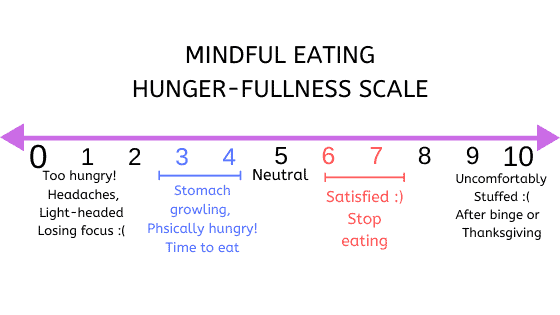
By now you may have heard of mindfulness. We are all busier than ever, and we are having a harder time living in the present moment. Practicing mindfulness can have many benefits. Did you know that mindful eating can help you reach your health goals? Eating mindfully will help you learn to listen to your body’s natural hunger cues, achieve and maintain a healthy weight, and stop overeating by taking time to enjoy your meals.
Did you know the average person spends nearly 50% of their day in thoughts about the past or the future? This means that we are only spending half of our day in the present.
For example, have you ever sat down with a plate of wonderful food and then suddenly noticed it was gone? No real memory of eating it or enjoying it? This is an example of not practicing mindful eating. It is not uncommon to become distracted by our to-do lists, projects and deadlines. But it becomes a problem when the distraction eliminates the enjoyment of the simple – but important – things in life.
For the purpose of healthy digestion as well as maintaining an optimal weight, mindful eating maybe one of your most important tools.
Below are some of our clients’ favorite tips for mindful eating:
Tip #1: Always eat sitting down. Never eat standing up.
We have all gone to the pantry or the fridge looking for a snack and while we are looking for what we want, we are grabbing and eating other things mindlessly. Or, you find yourself passing by a plate of something at work or home and grab a bite without really thinking about it. Or, you are clearing off the dinner table and finishing the food off of your kids’ plates.
These can all be eliminated by making a rule for yourself that you will only eat when sitting down. Always be sure to reduce distractions during meal times. Turn off the TV, don’t check your emails or social media, and put your work aside until after you have finished your meal.
Instead, focus on the pleasure of your food. Use meal times as an opportunity to take a step back from the fast-paced life and take time for yourself. Enjoy each bite of food think about the flavors and the textures.
Tip # 2: Time how long it takes you to eat a meal.
When when people decide to time their meals, they are surprised to find that they finish the whole meal in a matter of minutes. Not only does this negatively impact digestion, but it doesn’t allow your body to send signals to tell you when you are full. Your body has very important hormones called ghrelin and leptin to tell your brain when you are hungry and when you have had enough. One reason that people gain weight is that they are not waiting for these important signals.
Tip # 3: Use the Hunger-Fullness Scale
Have you ever eaten when you’re not hungry? Or waited so long to eat that you end up stuffing yourself? Or, maybe you have lost touch with your body entirely and aren’t sure whether you are hungry or full. Below is the Mindful Eating Hunger-Fullness Scale:

Before you eat, assess your hunger. Ideally, eat when you are at a 3. This is when your stomach starts growling and anything sounds good. Eat slowly enough to notice when you are at a 6 or 7. This is when you are satisfied – not hungry enough to continue eating, but not so full you feel uncomfortable. The Hunger-Fullness scale is an important tool to improve your awareness of your body’s natural signals. Using it consistently will help you get reconnected with your body and stop overeating as often.
When you practice mindful eating, you will experience better digestion, enjoy your meals more, and it is far easier to maintain your desired weight. Mindful eating is a key tool in reaching any health goals you set.
For more tips, head to our Facebook page where we post helpful videos on a variety of topics! To book a free coaching session, click here!

